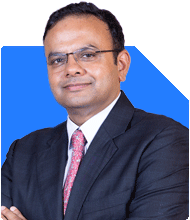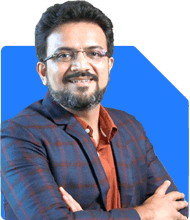Abhishek Dev | Answer |Ask -Follow
Financial Planner - Answered on Aug 29, 2023
A management graduate, he has over 21 years of experience in asset and wealth management.
He has been associated with reputed companies like HSBC GAM (India, south east Asia), PGIM, AMC, AMEX Bank, HDFC AMC and UTI in various roles, including leading business management, sales, marketing, product development and as a board member.... more

What is the future of IDFC First Bank. I want to invest for next six months. Thank you
You may like to see similar questions and answers below
Jigar Patel | Answer |Ask -Follow
Stock Market Expert - Answered on Feb 21, 2024
Samraat Jadhav |2514 Answers |Ask -Follow
Stock Market Expert - Answered on May 24, 2023
Advait Arora | Answer |Ask -Follow
Financial Planner - Answered on Aug 07, 2023
Samraat Jadhav |2514 Answers |Ask -Follow
Stock Market Expert - Answered on Jul 03, 2023
Advait Arora | Answer |Ask -Follow
Financial Planner - Answered on Jan 18, 2024
Ramalingam Kalirajan |10908 Answers |Ask -Follow
Mutual Funds, Financial Planning Expert - Answered on Dec 20, 2025
Ramalingam Kalirajan |10908 Answers |Ask -Follow
Mutual Funds, Financial Planning Expert - Answered on Dec 20, 2025
Naveenn Kummar |237 Answers |Ask -Follow
Financial Planner, MF, Insurance Expert - Answered on Dec 20, 2025
Ramalingam Kalirajan |10908 Answers |Ask -Follow
Mutual Funds, Financial Planning Expert - Answered on Dec 19, 2025
Nayagam P P |10859 Answers |Ask -Follow
Career Counsellor - Answered on Dec 19, 2025
Ramalingam Kalirajan |10908 Answers |Ask -Follow
Mutual Funds, Financial Planning Expert - Answered on Dec 19, 2025
Ramalingam Kalirajan |10908 Answers |Ask -Follow
Mutual Funds, Financial Planning Expert - Answered on Dec 19, 2025
Ramalingam Kalirajan |10908 Answers |Ask -Follow
Mutual Funds, Financial Planning Expert - Answered on Dec 19, 2025
Radheshyam Zanwar |6751 Answers |Ask -Follow
MHT-CET, IIT-JEE, NEET-UG Expert - Answered on Dec 19, 2025
Radheshyam Zanwar |6751 Answers |Ask -Follow
MHT-CET, IIT-JEE, NEET-UG Expert - Answered on Dec 19, 2025




























